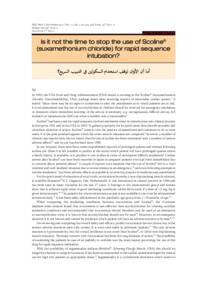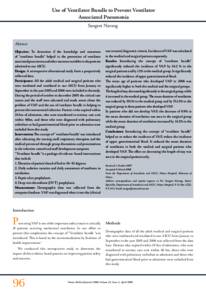وثيقة
Is it not the time to stop the use of Scoline® (suxamethonium chloride) for rapid sequence intubation?.
عناوين أخرى
أما آن الأوان لوقف استخدام السكولين في التنبيب السريع؟
الناشر
College of Medicine, Sultan Qaboos University.
ميلادي
2011-11
اللغة
الأنجليزية
الموضوع
الملخص الإنجليزي
In 1992, the USA Food and Drug Administration (FDA) issued a warning in the Scoline® (suxamethonium
chloride, GlaxoSmithKline, USA) package insert after receiving reports of intractable cardiac arrests.1 It
stated: "Since there may be no signs or symptoms to alert the practitioner as to which patients are at risk,
it is recommended that the use of succinylcholine in children should be reserved for emergency intubation
or instances where immediate securing of the airway is necessary, e.g. laryngospasm, difficult airway, full
stomach or intramuscular (IM) use when a suitable vein is inaccessible."
Scoline® has been used for rapid sequence tracheal intubation since its introduction into clinical practice
in Europe in 1951 and in the USA in 1952.2 It gained popularity for its quick onset (less than 60 seconds) and
ultrashort duration of action. Scoline® came to rule the practice of anaesthesia and continues to do so even
today. It is the gold standard against which the other muscle relaxants are compared;3 however, a number of
clinical case reports have shown clearly that the use of scoline has been associated with a number of serious
adverse effects4,5 and its use has declined since 1992.
المجموعة
ISSN
2075-0528
URL المصدر
zcustom_txt_2
Narang, Sangeet (2011). Is it not the time to stop the use of Scoline® (suxamethonium chloride) for rapid sequence intubation?.Sultan Qaboos University Medical Journal, 11 (4), 524-526.
قالب العنصر
مقالات الدوريات


